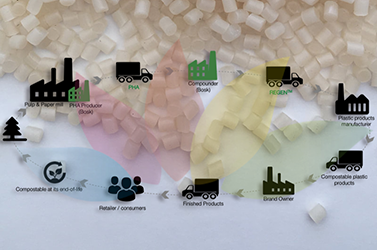
Canada supports innovation for compostable bioplastic at BOSK
Mike Edwards
News NRC Lifecycle of BOSK compostable bioplastics.
Lifecycle of BOSK compostable bioplastics. The Government of Canada has announced a $1-million investment to BOSK Bioproducts Inc. of Quebec City as part of the second phase of the Bioplastics Challenge. This challenge is aimed at helping small businesses reduce pollution by turning forest-based residue into sustainable plastic materials.
With this funding, BOSK will focus on the installation of a small-scale production line for prototyping the formulations of compostable bioplastics made from forest biomass, developed at National Research Council Canada. Additionally, it will allow for product formulation and better compatibility with existing industry manufacturing equipment.
As part of the first phase, BOSK developed a highly compostable and cost-effective new bioplastic made from paper mill sludge and wood fibre residue that could be used in areas like 3D printing, food packaging, plastic bottles and containers for cosmetics.
Natural Resources Canada collaborated with Agriculture and Agri-Food Canada to implement this challenge as part of the Domestic Plastics Challenge under the federal government’s Innovative Solutions Canada (ISC).
ISC is a $100-million program dedicated to supporting entrepreneurs and small businesses in developing innovative and sustainable solutions to complex environmental challenges. The government may then act as a first customer, helping these small businesses to commercialize their innovations, scaling up their business and creating good jobs for Canadians.
According to Marie-Claude Bibeau, Minister of Agriculture and Agri-Food, “there are so many farmers and agri-food businesses developing new and innovative renewable materials that cut down on plastic waste. Our government is committed to investing in bioplastics and to helping our agri-food sector lead Canada’s transition to a cleaner economy.”
Adds Laurence Boudreault, GM, BOSK, “NRCan’s contribution and this Innovative Solutions Canada program kicked off our project. This has allowed us to rally different players in the private and public sectors around a common goal, allowing us to move to a key stage in our market development strategy.
“This project positions Canada as a producer of compostable bioplastics in line with the foundations of sustainable development to finally offer a concrete solution to the plastics crisis.”
Print this page